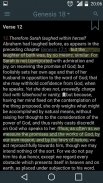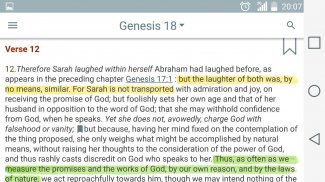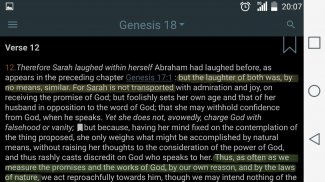













Calvin's Bible Commentaries

Descrição de Calvin's Bible Commentaries
John Calvin's Commentaries on the Bible
If You liked this book you can find version without advertisement in my applications: "Calvin Bible Commentary Pro"
A classic commentary on the Old and New Testaments, complete and unabridged. Written in a clear, lucid style, it combines a profound reverence for the Bible with a rare objectivity in its exegesis.
One of the most influential bible scholars of all time, John Calvin, although controversial, is a force to be reckoned with. His commentaries reflect an incredible command of the Scriptures, as he sought to integrate the entirety of its teaching by combining a solid exegetical method with a pastoral insight that is often neglected in commentaries today.
Calvin strikes a balance between passion and restraint, often infusing his writing with a distinct quality of controlled intensity. Scholars now recognize Calvin as above all else a teacher. He sought to open the Word of God in scripture to the common people from whom, he believed, the Bible had been withheld by the scholastics, monks and priests of the Roman church. By recapturing scripture's simple, genuine and natural sense, Calvin returned scripture to its rightful place in the church. His sole object as a teacher was "to lay down a pathway to the reading of sacred Scripture for the simple and uneducated."
John Calvin (Middle French: Jean Cauvin; 10 July 1509 -- 27 May 1564) was an influential French theologian and pastor during the Protestant Reformation. He was a principal figure in the development of the system of Christian theology later called Calvinism. Originally trained as a humanist lawyer, he broke from the Roman Catholic Church around 1530. After religious tensions provoked a violent uprising against Protestants in France, Calvin fled to Basel, Switzerland, where in 1536 he published the first edition of his seminal work Institutes of the Christian Religion.
Calvin was a tireless polemic and apologetic writer who generated much controversy. He also exchanged cordial and supportive letters with many reformers including Philipp Melanchthon and Heinrich Bullinger. In addition to the Institutes, he wrote commentaries on most books of the Bible as well as theological treatises and confessional documents, and he regularly gave sermons throughout the week in Geneva. Calvin was influenced by the Augustinian tradition, which led him to expound the doctrine of predestination and the absolute sovereignty of God in salvation.
Calvin's writing and preachings provided the seeds for the branch of theology that bears his name. The Presbyterian and other Reformed churches, which look to Calvin as a chief expositor of their beliefs, have spread throughout the world. Calvin's thought exerted considerable influence over major religious figures and entire religious movements, such as Puritanism, and some political historians have argued that his ideas have contributed to the rise of capitalism, individualism, and representative democracy in the West.Comentários de João Calvino sobre a Bíblia
Se você gostou deste livro que você pode encontrar a versão sem publicidade em minhas aplicações: "Calvin Comentário Bíblico Pro"
Um comentário clássico sobre o Antigo eo Novo Testamentos, completa e integral. Escrito em um estilo claro e lúcido, ele combina uma profunda reverência para a Bíblia com uma objetividade rara em sua exegese.
Um dos estudiosos da Bíblia mais influentes de todos os tempos, John Calvin, apesar de controverso, é uma força a ser contada com. Seus comentários refletem um comando incrível das Escrituras, como ele procurou integrar a totalidade do seu ensino através da combinação de um método exegético sólido, com uma visão pastoral que é muitas vezes negligenciada em comentários hoje.
Calvin estabelece um equilíbrio entre paixão e contenção, muitas vezes, infundindo sua escrita com uma qualidade diferenciada de intensidade controlada. Estudiosos reconhecem agora como Calvin acima de tudo um professor. Ele tentou abrir a Palavra de Deus nas Escrituras para as pessoas comuns de quem, ele acreditava que a Bíblia havia sido retidos pelos escolásticos, monges e sacerdotes da igreja romana. Ao recapturar sentido simples, genuíno e natural da escritura, Calvin voltou escritura para o seu devido lugar na igreja. Seu único objetivo como professor era "estabelecer um caminho para a leitura da Sagrada Escritura para o simples e sem instrução."
João Calvino (francês médio: Jean Cauvin, 10 de julho de 1509 - 27 de maio de 1564) foi um influente teólogo francês e pastor durante a Reforma Protestante. Ele era uma figura principal na evolução do sistema da teologia cristã mais tarde chamado calvinismo. Originalmente treinado como advogado humanista, ele rompeu com a Igreja Católica Romana por volta de 1530. Depois de tensões religiosas provocou uma revolta violenta contra os protestantes na França, Calvino fugiu para Basel, na Suíça, onde em 1536 ele publicou a primeira edição de sua obra seminal Institutos de Religião Cristã.
Calvin era um escritor polêmico e apologético incansável que gerou muita controvérsia. Ele também trocaram cartas cordiais e solidárias com muitos reformistas, incluindo Philipp Melanchton e Heinrich Bullinger. Além dos institutos, ele escreveu comentários sobre a maioria dos livros da Bíblia, bem como tratados teológicos e documentos confessionais, e ele deu sermões regularmente ao longo da semana, em Genebra. Calvin foi influenciado pela tradição agostiniana, que o levou a expor a doutrina da predestinação e da soberania absoluta de Deus na salvação.
Escrita e pregações de Calvino, desde as sementes para o ramo da teologia que leva seu nome. As igrejas Presbiteriana Reformada e outros, que olham para Calvin como um chefe de expositor de suas crenças, se espalharam por todo o mundo. Pensamento de Calvino exerceu uma influência considerável sobre as principais figuras religiosas e movimentos religiosos inteiros, como o puritanismo, e alguns historiadores políticos argumentaram que suas idéias têm contribuído para o surgimento do capitalismo, o individualismo, ea democracia representativa no Ocidente.
























